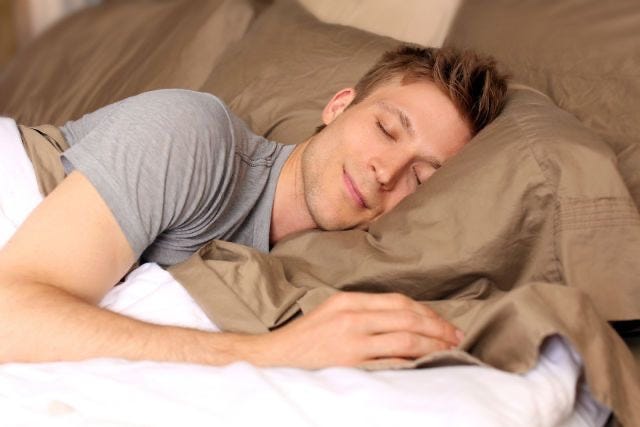Are you someone who struggles to get good sleep every night? You’re not alone. Many people deal with insomnia or restlessness and wake up feeling exhausted. But this can be cured just by following some simple tricks. Sticking to a consistent sleep schedule, limiting screen time before bed, creating a relaxing bedtime routine, optimising your sleep environment, and watching what you eat and drink can make a big difference. Try implementing one or more of these habits and you’ll be drifting off to dreamland in no time. Within a week or two, you should notice your falling asleep faster and sleeping more soundly through the night. Sweet dreams!
1- Stick to a Consistent Sleep Schedule: Top Trick to Improve Sleep
Sticking to a regular sleep schedule is the number one trick to improve your sleep. Your body’s internal clock thrives on consistency. It is best if you can go to bed and wake up at the same time every day, including weekends.
Not maintaining a sleeping and waking up routine, can disrupt your circadian rhythm and make it harder to fall asleep. If you stay up late and sleep in on the weekends, it’s like experiencing jet lag every weekend. No wonder you feel tired on Monday mornings!
A consistent sleep schedule, re energise your body to the maximum and you feel energetic the whole day. You’ll also find that you fall asleep faster at night. Over time, you may need less sleep overall and wake up naturally just before your alarm goes off.
To establish the right sleep schedule for you, pick a bedtime and wake time that allows for 7 to 9 hours of sleep, and stick to it. It may feel difficult at first, but your body and mind will adjust. Having a calming pre-sleep routine, limiting screen time before bed, and optimising your sleep environment can help you follow a consistent schedule.
The benefits of a good sleep schedule extend beyond how you feel. Regular sleep habits help fighting many diseases such as obesity, diabetes, cardiovascular disease and other health issues. By making this one simple lifestyle change, you’ll be doing your mind and body a huge favour. Sweet dreams!
2- Create a Relaxing Bedtime Routine: Best Tips to Get a Good Night’s Sleep
A good sleep routine is key to drifting off peacefully at night. Try starting your wind-down about an hour before bedtime. First, limit screen time – the blue light they emit disrupts your body’s natural circadian rhythm.
Instead, do something relaxing like reading a book, taking a warm bath, or listening to calming music. A bath is perfect for relieving tension and soothing your mind. To make the most of it, add some essential oils like lavender, chamomile or bergamot for extra relaxation.
Practice some deep breathing, meditation or light yoga. Gentle stretches release any pent up energy and meditation helps clear your mind. Even just 5-10 minutes can make a big difference.
Keep your bedroom cool, dark and quiet. Use your bed only for sleep – not watching TV, using electronics or doing work. Make sure you have a supportive mattress and pillows for maximum comfort.
Avoid heavy meals, caffeine, nicotine and alcohol close to bedtime. Have a light snack with carbohydrates and tryptophan, an amino acid that makes you drowsy. Herbal tea, warm milk with honey or a banana with nut butter are perfect options.
Sticking to a consistent routine and schedule will train your body to become sleepy at the same time each night. Start practicing these tips and you’ll be sleeping soundly in no time! Sweet dreams!
3- Limit Screen Time Before Bed: Easy Ways for the Best Sleep
Limiting screen time before bed is one of the best ways to improve your sleep. The blue light emitted from electronics like phones, tablets, and TVs disrupts your circadian rhythm and makes it harder to fall asleep.
Turn off electronics 1 hour before bed. Stop looking at bright screens at least 60 minutes before you want to fall asleep. The light they emit suppresses melatonin production, the hormone that makes you sleepy. Your body needs time to unwind from the stimulation.
Charge devices outside the bedroom. Don’t charge electronics in your bedroom overnight. The blinking lights and temptation to check them if you wake up in the middle of the night make it harder to fall back asleep.
No phones in bed. Make your bedroom a phone-free zone after a certain time of night. Scrolling through social media, checking email, or playing mobile games in bed activates your mind and delays sleep onset.
Try an e-reader instead. If you like to read before bed to relax, use an e-reader or other device without a backlit screen. Or keep a stack of physical books by your bedside. The soft glow is less disruptive than a tablet or smartphone.
Listen to something you like, be it a podcast or audiobook but stay away from chaotic music or content. If you get bored without electronics, try an engaging podcast, audiobook, meditation, or soft music to help you unwind. Make sure the volume is set on a timer to turn off so it doesn’t wake you later.
Establishing a calming pre-sleep routine and limiting screen time, light and stimulation before bed are some of the easiest ways to improve your sleep quality and ensure you get the rest you need each night. Making your bedroom an electronics-free zone will help you relax, decompress from the day and make falling asleep that much easier.
4- Create a Comfortable Sleep Environment: How to Sleep Well Every Night
To sleep well every night, creating an ideal sleep environment is key. Make your bedroom as comfortable and conducive to sleep as possible as plays a great role in the quality of sleep you are getting.
Keep it dark
Use blackout curtains or an eye mask to block outside light. Darkness stimulates the production of melatonin, the hormone responsible for feeling drowsy and sleepy. Even the glow from electronic devices, alarm clocks or streetlights can disrupt your sleep.
Make it quiet
Use a sound conditioner, earplugs or noise-canceling headphones to block out loud noises. Silence your phone and other electronics. Peace and quiet is relaxing and helps lull you to sleep. Consistent white noise like a fan can also help mask outside sounds. Keep your bedroom furniture in best shape so it does not shake or make any noise while you are moving in your sleep. These unwanted sounds of loose frame or worn out screws can not only surprise you but sometimes can give you a serious scare in your sleep.
Invest in a good mattress
A high-quality mattress and comfortable bedding are worth the investment. An old or poor mattress can lead to back pain, restlessness and poor sleep. Look for a mattress that keeps your spine aligned and relieves pressure points.
Keep it cool
The ideal temperature for sleep is around 65 degrees Fahrenheit. Your body temperature drops when you sleep, so a cooler room helps facilitate this natural decrease in temperature. Use a ceiling fan or keep the thermostat turned down for the best sleep environment.
Limit distractions
Remove electronics, bright clocks, stacks of bills/mail and anything else that might be distracting or stressful before bed. A clean, decluttered space will help calm your mind so you can relax into sleep.
Optimising your sleep environment can have significant impacts on your sleep quality and daytime wellness. Make your bedroom a sanctuary devoted to rest and relaxation. With these few adjustments, you’ll be drifting off to sleep in no time and waking up refreshed and recharged.
5- Watch Your Diet and Caffeine Intake: What to Avoid for Better Sleep
Observing your meals after six in the evening can be very helpful in improving sleep quality. Stimulants like caffeine, sugar, and nicotine can disrupt your sleep cycle even hours after consuming them.
Avoid caffeine, nicotine, and sugar close to bedtime. Caffeine from coffee, tea, and chocolate can keep you awake for up to 6 hours after drinking. Nicotine from vaping or cigarettes is also a stimulant. And while sugar may give you an initial energy boost, the crash later can wake you up in the middle of the night.
Stay away from large, heavy meals in the evening. Eating a big meal too close to bedtime means your body is working to digest it while you’re trying to sleep. The discomfort can make it hard to fall asleep and stay asleep. Instead, have an earlier, lighter dinner and maybe a small snack if you get hungry before bed.
Limit your alcohol intake, especially in the evening. While alcohol can make you drowsy, it actually disrupts your sleep later on as your body metabolises it. Limit your drinks to 1 for women and 2 for men, and avoid any alcohol 3 hours before bed.
Drinking plenty of water and other non-caffeinated beverages throughout the day is important for your health and sleep. Stay hydrated during the day, but cut back on fluids in the evening, otherwise you’ll likely have to wake up repeatedly to use the bathroom, interrupting your sleep. Stop drinking 1-2 hours before bed.
Making these diet and lifestyle changes may not get you to sleep right away, but avoiding certain foods, drinks and behaviours in the evening provides the right conditions for your body to relax, unwind and drift off to sleep naturally. Sweet dreams!
Conclusion
So there you have it, a few simple tricks to help you sleep like a baby tonight and every night. Stick to a bedtime routine. Having a relaxing bedtime routine is key to unwinding from the stresses of the day and prepping your mind and body for sleep. Limit that screen time and avoid the bright lights – your eyes and brain will thank you. Make your bedroom as cozy and inviting as possible so you have the perfect environment to drift off to dreamland. And watch what you eat and drink, especially in the evening. Caffeine and heavy meals too close to bedtime can disrupt your sleep. Sweet dreams! With some consistency, these tips will become second nature and you’ll be snoozing in no time.








